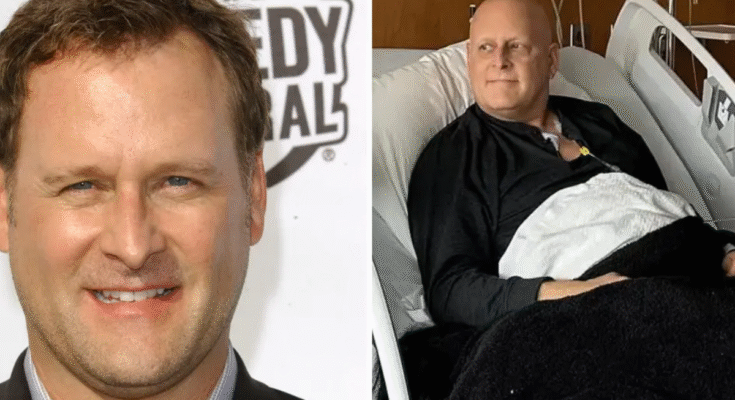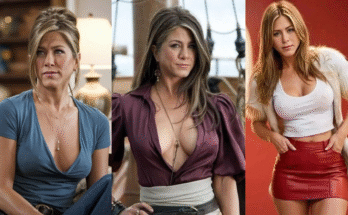The remarkable journey of David Alan Coulier, from aspiring comedian to beloved television uncle to voice acting legend
Introduction: The Heart Behind the Humor
David Alan “Dave” Coulier represents something increasingly rare in modern entertainment—a performer whose success stems from genuine warmth, authentic humor, and an unwavering commitment to bringing joy to others without cynicism or edge. For over four decades, Coulier has built a career on the simple but profound belief that laughter should heal rather than hurt, unite rather than divide, and celebrate the best of human nature rather than exploit its weaknesses.
From his early days performing impressions in Detroit comedy clubs to his iconic role as Joey Gladstone on “Full House,” from his extensive voice acting career to his journey through personal challenges and recovery, Coulier’s story is one of persistence, authenticity, and the transformative power of choosing optimism even during life’s darkest moments.
What sets Coulier apart in an industry often characterized by ego and competition is his consistent focus on collaboration, mentorship, and using his platform to support others. His famous “Cut it out!” catchphrase became more than just a comedic bit—it represented his approach to life, cutting out negativity and focusing on what brings people together rather than what drives them apart.
His journey through addiction and recovery, his commitment to sobriety, and his openness about personal struggles have made him not just an entertainer but an inspiration for others facing similar challenges. Through it all, he has maintained the essential qualities that made Joey Gladstone so beloved: kindness, loyalty, and an unshakeable belief in the power of family and friendship.
Chapter 1: Detroit Beginnings and Early Comedy Discovery (1959-1977)
Working-Class Roots and Family Foundation
David Alan Coulier was born on September 21, 1959, in St. Clair Shores, Michigan, a working-class suburb of Detroit. His parents, David L. Coulier and Arlen Couwlier, provided a stable, loving household that emphasized hard work, family loyalty, and the importance of treating others with respect—values that would become central to Dave’s personal and professional identity.
The Coulier household was one where humor served as both entertainment and coping mechanism. Dave’s natural inclination toward comedy emerged early, as he discovered that making people laugh could transform difficult situations into bearable ones and create connections with people who might otherwise remain strangers. This early understanding of comedy’s therapeutic power would become fundamental to his approach to entertainment.
Growing up in the Detroit area during the 1960s and 1970s exposed Dave to a diverse cultural environment where working-class values, ethnic diversity, and Midwestern practicality created a unique social landscape. This environment taught him about resilience, community support, and the importance of maintaining perspective during challenging times.
Dave was part of a generation that came of age during significant social changes—the civil rights movement, the Vietnam War, and cultural shifts that challenged traditional assumptions about authority and social norms. These experiences shaped his worldview and influenced his later approach to comedy, which emphasized inclusion, empathy, and finding common ground among diverse groups of people.
Early Signs of Comedic Talent
From elementary school onward, Dave demonstrated an unusual ability to mimic voices and create character impressions that entertained classmates and teachers alike. Unlike typical class clowns who often used humor to deflect attention or avoid responsibility, Dave’s comedy was genuinely funny and remarkably sophisticated for his age.
His talent for impressions wasn’t limited to famous people—he could capture the speech patterns, mannerisms, and distinctive qualities of teachers, family members, and neighborhood characters with uncanny accuracy. This skill required not just natural mimicry ability but also careful observation of human behavior and an intuitive understanding of what made people unique.
During middle school and high school, Dave’s reputation as a comedian grew among his peers. He wasn’t the stereotypical popular kid, but his humor earned him acceptance across different social groups. His ability to make people laugh without targeting or hurting anyone created an inclusive form of entertainment that brought people together rather than dividing them.
His teachers generally appreciated his humor because it enhanced rather than disrupted classroom environments. Dave learned early that comedy could be used constructively, creating positive atmospheres and helping people feel more comfortable and connected to each other.
High School Development and Performance Experience
At Notre Dame High School in Harper Woods, Michigan, Dave began more seriously exploring his comedic interests through school productions, talent shows, and informal performances. These experiences taught him about timing, audience engagement, and the technical aspects of performance that would prove essential throughout his career.
His high school years also introduced him to the mechanics of entertainment production—lighting, sound, staging, and the collaborative nature of creating successful performances. This technical knowledge would later make him a more valuable performer and collaborator in professional settings.
Dave’s academic performance was solid, but his real education was happening through his comedy work. He was learning about human psychology, social dynamics, and the craft elements that separate professional entertainment from amateur attempts. These lessons were as valuable as any formal education in preparing him for his future career.
During this period, Dave also began developing his signature style—clean, character-based humor that relied on skill and creativity rather than shock value or offensive content. This approach reflected both his personal values and his understanding that the best comedy comes from truth and genuine observation rather than artificial provocation.
Early Professional Exploration
While still in high school, Dave began exploring opportunities to perform professionally in local venues. The Detroit area had a vibrant comedy scene that provided aspiring performers with opportunities to develop their skills and test their material with real audiences.
His early performances at local clubs and events taught him about the business side of entertainment—booking, promotion, working with venue managers, and the importance of building professional relationships based on reliability and quality work. These lessons would prove invaluable throughout his career.
The feedback he received from these early audiences helped Dave refine his act and understand which types of material worked best for different audiences. He learned to adapt his performance style to various venues and crowd types while maintaining his essential comedic voice and values.
These early professional experiences also introduced Dave to other aspiring entertainers, creating a network of relationships that would provide mutual support and collaboration opportunities throughout their careers. The bonds formed during these formative years often proved more lasting and meaningful than later professional relationships formed under more competitive circumstances.
Voice and Character Work Development
During his late teens, Dave began seriously developing the voice work and character creation skills that would become central to his professional success. His natural ability to create distinct character voices was enhanced through practice and experimentation with different vocal techniques and character concepts.
He studied how professional voice actors and impressionists created their characters, learning about vocal placement, timing, and the physical aspects of voice work that help create believable and entertaining characters. This self-directed education was crucial in developing his professional-level skills.
Dave’s character work went beyond simple impressions to include original character creation. He developed unique personas with distinct personalities, speech patterns, and comedic perspectives that could work in various entertainment contexts. This versatility would later make him valuable for voice acting work and television comedy.
His approach to character work emphasized authenticity and empathy—even when creating exaggerated or comedic characters, he tried to find genuine human qualities that audiences could recognize and relate to. This approach created more engaging and memorable characters that resonated with audiences beyond their initial comedic impact.
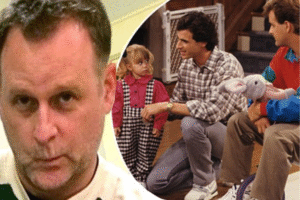
Chapter 2: The Struggle Years and Comedy Circuit Development (1977-1987)
Post-High School Reality and Career Decisions
After graduating from high school in 1977, Dave faced the common challenge of deciding whether to pursue traditional career paths or risk everything on his entertainment dreams. Unlike many aspiring performers who move to Los Angeles or New York immediately, Dave chose to develop his skills locally while building experience and confidence.
His decision to remain in the Detroit area initially was both practical and strategic. The local comedy scene provided opportunities to perform regularly and develop his craft without the intense competition and high costs associated with major entertainment centers. This approach allowed him to mature as a performer while maintaining financial stability.
During this period, Dave worked various jobs to support himself while pursuing comedy in the evenings and weekends. These experiences provided him with material for his comedy while also teaching him about different aspects of working life that would inform his later portrayals of everyday people and situations.
His work ethic during this period was remarkable—maintaining day jobs while performing several nights per week, constantly writing new material, and seeking opportunities to improve his skills and expand his audience. This dedication demonstrated the commitment necessary for long-term success in entertainment.
Detroit Comedy Scene and Skill Development
The Detroit comedy scene of the late 1970s and early 1980s was vibrant and supportive, providing emerging comedians with opportunities to perform regularly and learn from more experienced performers. Dave immersed himself in this community, performing at clubs like Chaplin’s and other venues that featured live comedy.
His progression through the local comedy hierarchy was gradual but steady. He began with open mic nights and short sets, working his way up to longer performance slots and better venues as his skills developed and his reputation grew. This methodical approach taught him about persistence and the importance of earning advancement through quality work.
The Detroit comedy community was known for its collaborative spirit and mentorship culture. Established performers often helped newcomers by providing advice, sharing opportunities, and creating supportive environments where emerging comedians could take creative risks and learn from mistakes without devastating consequences.
Dave’s reputation within this community was built on his reliability, positive attitude, and willingness to help other performers. He became known not just for his comedic abilities but also for his character and professionalism—qualities that would serve him throughout his career and help him build lasting professional relationships.
Material Development and Signature Style Formation
During his years on the Detroit comedy circuit, Dave developed the material and comedic style that would define his professional career. His approach emphasized character voices, impressions, and observational humor about family life, relationships, and everyday situations that audiences could relate to personally.
His signature impressions began emerging during this period—not just mimicry of famous people, but original character voices and personas that became regular parts of his act. These characters were often inspired by real people he encountered in his daily life, filtered through his comedic perspective and enhanced for entertainment value.
Dave’s commitment to clean comedy wasn’t a calculated business decision but a reflection of his personal values and his belief that humor should bring people together rather than exclude or offend them. This approach sometimes limited his opportunities in clubs that preferred edgier material, but it also distinguished him in a crowded field.
His material development process was methodical and disciplined. He kept detailed notes about what worked with different audiences, constantly refining and improving his best material while discarding bits that didn’t connect. This analytical approach to comedy helped him develop consistently entertaining performances.
Regional Expansion and Growing Recognition
As Dave’s reputation grew within the Detroit comedy scene, he began expanding his performance territory to include clubs in Chicago, Cleveland, and other Midwest markets. This regional touring provided him with experience performing for diverse audiences while building a fan base beyond his home territory.
These out-of-town performances were crucial learning experiences, teaching Dave about adapting his material for different regional sensibilities and cultural contexts. He learned that successful touring required flexibility and sensitivity to local preferences while maintaining his essential comedic voice.
The feedback he received from audiences in different markets helped Dave understand which aspects of his comedy had universal appeal and which elements needed adjustment for broader audiences. This knowledge would prove valuable when he later transitioned to national television work.
His growing reputation also began attracting attention from talent scouts and industry professionals who were looking for fresh comedic talent. These early industry connections would eventually lead to opportunities for television work and voice acting that would transform his career.
Early Television and Radio Work
Dave’s first professional television and radio opportunities came through local Detroit stations that featured live comedy or variety programming. These experiences provided him with crucial training in broadcast performance, which required different skills than live club work.
Working in radio taught Dave about voice projection, timing for broadcast, and working with directors and producers who had different priorities than live audience entertainment. These skills would prove essential for his later voice acting career and television work.
His early television appearances, while limited to local programming, provided him with experience working with cameras, lighting, and the technical aspects of television production. This education was invaluable preparation for his later network television success.
These broadcast experiences also taught Dave about the business side of entertainment—contracts, unions, and the complex relationships between performers, agents, managers, and production companies. This education helped him navigate the entertainment industry more effectively as his career advanced.
Preparation for National Opportunities
By the mid-1980s, Dave had developed into a polished, professional comedian with a distinctive style and growing regional reputation. His clean comedy approach, combined with his character voices and impressions, made him attractive to television producers looking for family-friendly entertainment.
His extensive experience performing live had given him confidence, stage presence, and the ability to connect with audiences quickly—qualities that translated well to television work. He had also developed a substantial amount of material that could be adapted for different television formats.
Dave’s reputation for professionalism and reliability made him attractive to producers and directors who valued performers they could count on to deliver quality work consistently. His positive attitude and collaborative approach also made him popular with fellow performers and crew members.
As opportunities for national television work began emerging in the late 1980s, Dave was well-prepared to take advantage of them. His years of preparation, skill development, and professional networking had positioned him for the breakthrough that would transform his career and introduce him to national audiences.
Chapter 3: Full House Era and Career Transformation (1987-1995)
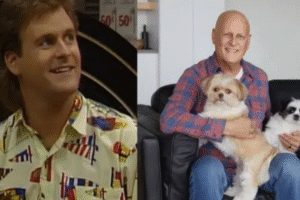
Landing the Joey Gladstone Role
When Dave auditioned for “Full House” in 1987, he was competing against numerous established comedians and actors for what would become one of television’s most beloved supporting roles. His audition showcased not only his comedic abilities but also his natural warmth and his ability to connect with child actors—crucial qualities for the Joey Gladstone character.
The audition process revealed Dave’s versatility and his understanding of family comedy dynamics. He demonstrated that he could be genuinely funny while also being nurturing and responsible, a combination that was essential for a character who would serve as both comic relief and surrogate father figure.
His chemistry with Bob Saget and John Stamos was evident from early readings, creating the foundation for the authentic male friendship that would become central to the show’s appeal. Their different comedic styles—Dave’s character work, Bob’s observational humor, and John’s charm—complemented each other naturally.
The casting directors recognized that Dave brought something unique to the role—his character voices and impressions could provide ongoing entertainment value while his genuine warmth would make Joey’s relationship with the Tanner children believable and emotionally satisfying.
Character Development and Creative Contributions
Joey Gladstone was initially conceived as a fairly standard comic relief character, but Dave’s creative input and natural abilities allowed the character to develop in more complex and interesting directions. His improvisation skills and character voices became integral to the show’s humor and charm.
Dave’s famous “Cut it out!” catchphrase, accompanied by his signature hand gesture, emerged organically from his performance rather than being scripted. This spontaneous creation became one of the show’s most recognizable elements and demonstrated Dave’s instinctive understanding of what would resonate with audiences.
His ability to create voices and characters on the spot provided writers with new material and gave his fellow actors additional comedic moments to play against. Dave’s improvisational contributions often made scripted scenes funnier and more memorable while staying true to the show’s family-friendly tone.
The character of Joey allowed Dave to incorporate many of his real-life comedy skills—impressions, voice work, and prop comedy—into scripted television. This integration of his natural talents with professional television production created authentic performances that felt spontaneous even within the structured sitcom format.
Behind-the-Scenes Contributions and Mentorship
As “Full House” developed, Dave naturally assumed a mentorship role with the younger cast members, particularly the child actors who played the Tanner daughters. His genuine care for their wellbeing and professional development created a supportive environment that enhanced their performances while protecting their personal growth.
His approach to working with children was informed by his own positive experiences with adult mentors during his early career. He understood that young performers needed both professional guidance and personal support to navigate the unique challenges of working in television while maintaining their childhood development.
Dave’s collaborative approach to comedy made him a valuable creative partner for the show’s writers and producers. His willingness to experiment with different approaches to scenes and his ability to make suggestions that improved material made him an asset beyond his on-screen performance.
His positive attitude and professional work ethic set high standards for the entire production while creating an enjoyable working environment. Cast and crew members consistently praised Dave for his kindness, reliability, and commitment to the show’s quality and values.
Voice Acting Career Development
Concurrent with his “Full House” success, Dave began building what would become an extensive voice acting career. His character voice abilities and clean comedy style made him particularly valuable for children’s programming and animated series that required skilled vocal performers.
His work on “The Real Ghostbusters” animated series was particularly significant, as he took over the voice of Peter Venkman from Bill Murray. This role required him to capture the essence of Murray’s character while making it his own for the animated format, demonstrating his ability to honor existing characters while bringing his own interpretation to roles.
The voice acting work provided Dave with steady income and creative satisfaction during and after “Full House,” allowing him to maintain financial stability while pursuing other projects and maintaining artistic flexibility. This career diversification proved wise as it protected him from being completely dependent on any single project.
His reputation in voice acting grew throughout the “Full House” years, leading to numerous opportunities in animated series, commercials, and other voice work that utilized his vocal versatility and character creation abilities. This parallel career path ensured his continued relevance in entertainment even as “Full House” eventually ended.
Personal Challenges and Growth
During the “Full House” years, Dave faced personal challenges that he would later discuss openly as part of his journey toward sobriety and personal growth. His struggles with alcohol began during this period of professional success, creating internal conflicts between his public image and private difficulties.
The demands of television production, combined with the social pressures of Hollywood success, contributed to drinking patterns that would eventually require professional intervention and commitment to recovery. These challenges were largely hidden from public view but affected his personal relationships and overall wellbeing.
His approach to handling these personal difficulties while maintaining professional responsibilities demonstrated both his commitment to his work and the complexity of managing addiction while functioning in a high-pressure career environment. His later openness about these struggles would help others facing similar challenges.
The support he received from his “Full House” family during this period was crucial to his eventual recovery process. The genuine relationships formed on set provided him with people who cared about his wellbeing beyond his professional value, creating accountability and motivation for addressing his personal challenges.
Creative Expansion and Future Planning
As “Full House” progressed, Dave began exploring opportunities to expand his creative involvement in the show while also developing projects that would utilize his skills in different contexts. His experience in television production taught him about writing, directing, and the business aspects of entertainment creation.
His voice acting success encouraged him to consider developing original animated projects or other creative ventures that would allow him to use his character creation abilities more extensively. These explorations planted seeds for future career directions beyond his “Full House” role.
Dave’s networking within the entertainment industry during this period created relationships that would provide future opportunities and collaborations. His reputation for professionalism and creativity made him attractive to other producers and creative professionals seeking reliable collaborators.
His financial success from “Full House” and voice acting provided him with the security to take creative risks and pursue projects that interested him personally rather than simply accepting any available work. This freedom would prove valuable as he planned for life after the show’s eventual conclusion.
Chapter 4: Personal Struggles and the Journey to Sobriety (1990s-2000s)
The Hidden Battle with Alcohol
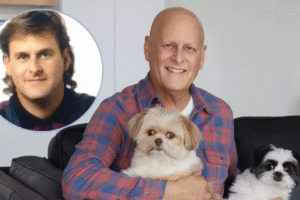
While Dave’s professional success during the “Full House” years appeared seamless from the outside, he was privately struggling with alcohol dependency that would eventually require serious intervention and commitment to recovery. His drinking problem developed gradually, beginning as social drinking that slowly escalated into a coping mechanism for stress and personal insecurities.
The entertainment industry’s culture, which often normalizes heavy drinking as part of social and professional networking, provided an environment where Dave’s developing alcohol dependency could go unnoticed or be dismissed as typical behavior for someone in his position. This cultural context made it easier to rationalize problematic drinking patterns.
Dave’s natural ability to function professionally while struggling personally allowed him to maintain his career responsibilities even as his personal life was becoming increasingly affected by alcohol. This functional alcoholism created a dangerous situation where the problem could persist without immediate professional consequences that might have prompted earlier intervention.
His drinking affected his personal relationships, including his marriage to Jayne Modean, whom he married in 1990. The stress of maintaining public and professional personas while dealing with private struggles created additional pressure that further complicated his relationship with alcohol and his ability to address the underlying issues.
Recognition and Commitment to Recovery
Dave’s decision to pursue sobriety came from his recognition that his drinking was affecting not only his own wellbeing but also his relationships with people he cared about. The process of acknowledging the problem and committing to recovery required significant courage and humility, particularly for someone in the public eye.
His approach to recovery was serious and comprehensive, involving professional treatment and ongoing commitment to sobriety practices that would support his long-term success. He understood that recovery wasn’t a one-time decision but an ongoing process that would require continuous attention and commitment.
The support he received from his “Full House” family and other close friends was crucial during his recovery process. Their non-judgmental support and practical assistance helped him navigate the challenges of early sobriety while maintaining his professional responsibilities and public commitments.
Dave’s recovery process also involved examining the underlying issues that had contributed to his alcohol dependency, including stress management, relationship patterns, and coping mechanisms. This comprehensive approach addressed not just the drinking behavior but the broader life patterns that had supported it.
Impact on Career and Creative Work
Dave’s commitment to sobriety actually enhanced his creative work and professional performance rather than limiting them. His clearer thinking and improved emotional stability allowed him to approach his work with greater focus and creativity than he had experienced during his drinking years.
His voice acting career continued to flourish during his recovery, as his improved reliability and enhanced creative abilities made him even more valuable to producers and directors. His reputation for professionalism was strengthened rather than damaged by his commitment to addressing his personal challenges.
The experience of recovery also provided Dave with new material and perspectives for his comedy work. His ability to find humor in personal struggles and recovery processes, while respecting the seriousness of addiction issues, created authentic and relatable content that resonated with audiences.
His openness about his recovery journey, when he eventually chose to discuss it publicly, enhanced rather than damaged his public image. Audiences appreciated his honesty and courage in addressing difficult personal issues, and his story provided inspiration for others facing similar challenges.
Relationship Changes and Personal Growth
Dave’s recovery process involved significant changes in his personal relationships, including the end of his marriage to Jayne Modean. While painful, these relationship changes were necessary parts of his overall healing and growth process, allowing him to build healthier patterns going forward.
His approach to dating and relationships after recovery was more thoughtful and intentional than his previous patterns. He brought greater self-awareness and emotional honesty to new relationships, creating opportunities for more genuine and sustainable connections with others.
His relationship with his son from his first marriage remained strong throughout his recovery process, and his sobriety actually enhanced his ability to be present and supportive as a father. His commitment to recovery was partly motivated by his desire to be the best parent possible.
The personal growth that accompanied Dave’s recovery extended beyond his relationship with alcohol to include broader patterns of self-care, stress management, and emotional intelligence. These improvements enhanced all aspects of his life and relationships, creating a foundation for long-term happiness and success.
Professional Advocacy and Support for Others
As Dave became more comfortable discussing his recovery journey, he began using his platform to support others facing similar challenges. His willingness to speak honestly about addiction and recovery helped reduce stigma and provided encouragement for people seeking help for their own struggles.
His advocacy work wasn’t preachy or prescriptive—he simply shared his own experience and emphasized that recovery was possible with proper support and commitment. This approach respected others’ autonomy while providing hope and practical information about resources and strategies that had worked for him.
Dave’s support for recovery-related charities and organizations provided practical assistance to programs helping others with addiction issues. His involvement went beyond financial contributions to include personal appearances and ongoing advocacy that raised awareness and funds for important causes.
His example of successful recovery while maintaining a thriving career helped dispel myths about addiction and recovery that might discourage people from seeking help. His story demonstrated that addressing personal challenges could enhance rather than damage professional success and personal relationships.
Building a Foundation for Future Success
Dave’s recovery process created a stronger foundation for all aspects of his life going forward. His improved emotional stability, enhanced self-awareness, and healthier coping mechanisms positioned him for continued success and happiness in both personal and professional contexts.
The discipline and commitment required for maintaining sobriety translated into other areas of his life, enhancing his work ethic, creative output, and relationship skills. The structure and mindfulness that supported his recovery also improved his overall approach to life and career management.
His recovery journey taught him about resilience, personal responsibility, and the importance of ongoing self-care—lessons that would serve him well as he navigated future challenges and opportunities. These skills became part of his essential character rather than just recovery techniques.
The authenticity and emotional honesty that recovery required also enhanced his creative work, allowing him to bring greater depth and genuine emotion to his performances while maintaining the humor and optimism that characterized his public persona.
Chapter 5: Voice Acting Career and Creative Diversification (1990s-2010s)
Establishing Voice Acting Credentials
While Dave’s “Full House” success provided him with widespread recognition, his parallel development as a voice actor created an entirely separate and equally important career track that would provide both creative satisfaction and financial stability for decades. His natural talent for character voices, combined with his professional work ethic, made him highly sought after in the competitive voice acting industry.
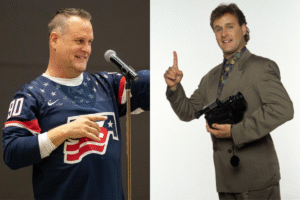
His early voice work included animated series, commercials, and children’s programming where his clean comedy style and ability to create distinct, memorable characters made him particularly valuable. Unlike many actors who view voice work as secondary to on-camera performance, Dave approached voice acting as a specialized craft requiring unique skills and techniques.
The technical aspects of voice acting—vocal placement, character consistency, working with directors remotely, and adapting to different recording environments—required Dave to develop new professional skills beyond his live performance and television experience. His willingness to master these technical elements distinguished him from other performers seeking voice work.
His reputation in voice acting grew through word-of-mouth recommendations from directors and producers who appreciated his reliability, creativity, and ability to bring characters to life through vocal performance alone. This professional network became self-sustaining as satisfied clients recommended him for new projects.
Signature Voice Roles and Character Development
Dave’s work as Peter Venkman in “The Real Ghostbusters” animated series was particularly significant because it required him to capture the essence of Bill Murray’s iconic character while making it his own for the animated format. This challenge demonstrated his ability to honor existing characters while bringing his own interpretation and energy to established roles.
His approach to voice acting emphasized character development and emotional authenticity rather than simply creating funny voices. Each character he portrayed had distinct personality traits, motivations, and emotional patterns that informed the vocal choices and performance decisions he made throughout the recording process.
Dave’s versatility as a voice actor allowed him to work across different genres and age demographics—from children’s cartoons to adult animated series, from commercial work to video game characters. This range prevented him from being typecast and provided steady work opportunities throughout different market cycles.
His character creation process was sophisticated and methodical. He developed backstories and emotional profiles for his characters that went far beyond what was written in scripts, creating fully realized personalities that could be sustained across multiple episodes or projects while remaining consistent and believable.
Technical Mastery and Professional Development
Voice acting required Dave to master technical skills that were different from his live performance background. He learned about microphone techniques, sound engineering basics, and how to optimize his vocal performance for different recording environments and playback systems.
His understanding of timing for animation and other voiced media was particularly sophisticated. Unlike live performance where timing can be adjusted in real-time based on audience response, voice acting requires precise timing that must work with predetermined visual elements and editing structures.
Dave’s ability to work efficiently in recording sessions made him valuable to producers working with limited budgets and tight schedules. His preparation, professionalism, and ability to deliver usable takes quickly saved time and money while maintaining high quality standards.
His collaboration with sound engineers and directors was consistently positive because he understood the technical constraints and possibilities of voice recording while also bringing creative ideas that enhanced the final product. This combination of technical competence and creative contribution made him a preferred collaborator.
Industry Recognition and Career Longevity
Throughout the 1990s and 2000s, Dave’s voice acting career provided him with consistent work and industry recognition that was independent of his “Full House” fame. His success in voice acting proved his versatility as a performer and his ability to build sustainable career paths in multiple areas of entertainment.
The longevity of his voice acting career demonstrated the wisdom of his approach to skill development and professional relationship building. While many performers saw their careers decline after their most famous roles ended, Dave’s voice work provided continuous opportunities for creative expression and financial stability.
His work in voice acting also influenced his live performance and television work, as the character development skills and vocal techniques he mastered enhanced his overall performing abilities. The discipline required for voice work—precision, consistency, and imagination—strengthened his entire artistic toolkit.
Recognition from industry professionals in voice acting validated Dave’s artistic abilities beyond his comedic persona, establishing him as a serious performer whose skills were valued across different entertainment sectors. This recognition enhanced his overall reputation and created additional career opportunities.
Creative Projects and Original Content Development
Dave’s experience in voice acting led to opportunities to develop original characters and content rather than simply performing roles created by others. His understanding of what made characters appealing and sustainable allowed him to contribute to creative development processes as well as performance.
His work on various animated projects provided him with insights into production processes, audience preferences, and market dynamics that informed his approach to developing his own creative projects. This education prepared him for potential future work as a creator and producer rather than just a performer.
The creative freedom available in voice acting—particularly in developing original characters for commercials and smaller projects—allowed Dave to experiment with different performance styles and character concepts without the visibility and risk associated with his more public work.
His reputation for creativity and reliability in voice work led to consulting opportunities where he could provide input on character development, casting decisions, and creative direction for animated projects. These roles demonstrated his evolution from performer to creative collaborator and advisor.
Integration with Overall Career Strategy
Dave’s voice acting success complemented rather than competed with his other career activities, creating a diversified professional portfolio that provided both stability and creative satisfaction. This strategic approach to career development protected him from the vulnerability that comes with dependence on any single type of work.
The skills he developed through voice acting—character consistency, emotional authenticity, and technical precision—enhanced his television and live performance work. The cross-pollination between different aspects of his career created synergies that strengthened his overall artistic abilities.
His reputation in voice acting also provided credibility and leverage in negotiations for other projects, as producers and agents recognized that he had multiple revenue streams and wasn’t desperate for any particular opportunity. This strength enhanced his ability to choose projects based on creative and personal criteria rather than just financial necessity.
The steady income from voice work allowed Dave to take creative risks in other areas of his career, pursuing projects that interested him personally rather than simply accepting whatever opportunities were available. This freedom enhanced his artistic satisfaction and long-term career sustainability.
Chapter 6: Fuller House Return and Legacy Building (2016-2020)
Reunion Dynamics and Character Revival
When “Fuller House” was developed for Netflix, Dave’s participation was crucial not only for nostalgia value but also for maintaining the authentic family dynamics that had made the original series successful. His return as Joey Gladstone required him to find ways to evolve the character while preserving the essential qualities that had made him beloved.
The challenge of portraying an older version of Joey was significant—the character needed to feel like the same person while also demonstrating realistic growth and maturation. Dave’s approach balanced familiar comedic elements with subtle indicators of how Joey might have developed over the intervening years.

His chemistry with Bob Saget and John Stamos remained strong, creating continuity with the original series while also showing how their friendship had evolved and deepened over time. Their interactions provided some of the reboot’s most emotionally satisfying moments, demonstrating that their bonds transcended their professional relationships.
The reunion also allowed Dave to demonstrate how his own personal growth and recovery had enhanced his ability to bring depth and authenticity to his character work. His increased self-awareness and emotional stability were reflected in his performance without overwhelming the character’s essential humor and warmth.
Mentoring New Generation Performers
Dave’s work on “Fuller House” included significant interactions with the child actors who played the next generation of the family, allowing him to use his experience from the original series to support young performers facing similar challenges to those he had witnessed decades earlier.
His approach to mentoring was informed by his own experiences being mentored during his early career and his observations of how the original child actors had been supported. He understood the importance of creating safe, supportive environments where young performers could develop their skills while maintaining their personal wellbeing.
The intergenerational dynamic on “Fuller House” also provided Dave with opportunities to demonstrate how experience and wisdom could enhance rather than limit creative performance. His interactions with younger cast members showed how veteran performers could contribute to productions beyond their individual roles.
His involvement in “Fuller House” also allowed him to share the lessons he had learned about addiction and recovery with younger performers who might face similar challenges. His openness about his journey provided them with awareness and resources that might help them make healthier choices.
Creative Input and Production Involvement
As a returning cast member with extensive industry experience, Dave had opportunities to provide input on “Fuller House” storylines, character development, and overall production quality. His insights were valuable because of his understanding of what had made the original series successful and his knowledge of contemporary audience expectations.
His suggestions for Joey’s character development helped ensure that the character remained relevant and engaging while honoring the original series’ values and tone. His creative input contributed to storylines that felt authentic rather than forced or purely nostalgic.
Dave’s technical knowledge from his voice acting career and his understanding of production processes made him a valuable collaborator behind the scenes as well as in front of the camera. His contributions helped maintain the quality standards that distinguished “Fuller House” from less successful reboot attempts.
His positive attitude and collaborative approach continued to enhance the working environment on “Fuller House,” creating the same kind of supportive atmosphere that had characterized the original series. This continuity was important for both cast comfort and audience authenticity.
Reflection on Career and Personal Journey
The “Fuller House” experience provided Dave with opportunities to reflect on his career journey and the personal growth he had achieved since the original series ended. His participation in the reboot allowed him to demonstrate how recovery and personal development had enhanced rather than limited his creative abilities.
His approach to discussing his recovery journey during “Fuller House” promotion was thoughtful and appropriate, sharing his experience when relevant while respecting the family-friendly nature of the show and its audience. This balance demonstrated his maturity and understanding of his platform’s responsibilities.
The success of “Fuller House” validated Dave’s career choices and his commitment to maintaining the values and relationships that had been important to him throughout his professional journey. The positive reception showed that authenticity and consistency were valued by audiences across different generations.
His work on the reboot also provided him with closure on the Joey Gladstone character while opening possibilities for future projects that might build on the renewed interest in his work and the increased awareness of his recovery advocacy.
Legacy Considerations and Future Planning
Dave’s participation in “Fuller House” was part of a broader process of legacy building that included his recovery advocacy, his continued voice acting work, and his efforts to use his platform for positive purposes. His approach to legacy building emphasized authentic contribution rather than manufactured significance, focusing on how his work and example could genuinely help others.
The success of “Fuller House” provided Dave with renewed visibility and credibility that he used strategically to support causes and projects that aligned with his values. His platform gave him opportunities to advocate for addiction recovery resources and mental health awareness while maintaining his commitment to family-friendly entertainment.
His future planning during this period balanced professional opportunities with personal priorities, ensuring that new projects would enhance rather than conflict with his recovery maintenance and family relationships. This thoughtful approach to career development reflected the wisdom he had gained through his personal journey.
Chapter 7: Current Life and Continued Impact (2020-Present)
Post-Fuller House Career Direction
Following the conclusion of “Fuller House” in 2020, Dave has continued to balance his established career strengths with new opportunities that reflect his evolved priorities and interests. His approach to selecting projects has become increasingly thoughtful, choosing work that aligns with his values while providing creative satisfaction and professional fulfillment.
His continued voice acting work remains a constant in his professional life, providing both stability and creative outlet for his character development skills. The steady demand for his voice work demonstrates the enduring value of the skills he developed over decades in this specialized field.
Dave has also increased his involvement in live performance and stand-up comedy, returning to his roots while incorporating the wisdom and experience gained through his television success and personal growth. His current comedy material reflects his journey through addiction and recovery while maintaining his commitment to positive, inclusive humor.
His selective approach to new television and film projects reflects his understanding that his reputation and legacy are more valuable than any individual paycheck. This perspective allows him to choose roles and projects that genuinely interest him rather than simply accepting available opportunities.
Recovery Advocacy and Community Support
Dave’s commitment to recovery advocacy has become an increasingly important aspect of his public platform and personal mission. His willingness to discuss his sobriety journey honestly and openly has provided inspiration and practical guidance for others facing similar challenges.
His advocacy work emphasizes that recovery is possible and that seeking help is a sign of strength rather than weakness. His example demonstrates that addiction doesn’t have to end careers or destroy relationships when addressed with appropriate support and commitment.
Dave’s involvement with recovery organizations and treatment facilities goes beyond celebrity endorsements to include genuine participation in programs and events that provide direct support to people seeking help. His hands-on approach reflects his understanding that advocacy requires action as well as words.
His recovery advocacy also includes supporting family members and friends of people struggling with addiction, recognizing that recovery affects entire support networks rather than just individuals. This comprehensive approach addresses the broader impact of addiction and recovery on communities and relationships.

Family Life and Personal Relationships
Dave’s current personal life reflects the stability and emotional health he has achieved through his recovery and personal growth work. His marriage to Melissa Bring in 2014 represents a partnership built on mutual understanding, shared values, and genuine compatibility rather than just attraction or convenience.
Melissa’s support for Dave’s recovery and her understanding of the entertainment industry’s unique challenges have created a foundation for a healthy, sustainable relationship. Their partnership demonstrates how recovery can enhance rather than limit opportunities for meaningful personal connections.
Dave’s relationship with his son Luc from his first marriage has remained strong throughout his recovery journey and continues to be a source of pride and motivation. His approach to fatherhood has been enhanced by his sobriety and personal growth, allowing him to be more present and emotionally available.
His extended relationships with his “Full House” family continue to provide personal satisfaction and professional opportunities. These enduring bonds demonstrate the authentic nature of the connections formed during the show’s production and their continued importance in his life.
Health and Wellness Focus
Dave’s commitment to sobriety has expanded into a broader focus on health and wellness that includes physical fitness, mental health maintenance, and lifestyle choices that support his overall wellbeing. This comprehensive approach to health reflects his understanding that recovery requires ongoing attention to multiple aspects of life.
His fitness routine and healthy lifestyle choices have become part of his public persona, demonstrating that sobriety can enhance rather than limit life enjoyment and personal satisfaction. His example shows that healthy choices can be fulfilling rather than restrictive when approached with the right mindset.
Dave’s attention to mental health includes ongoing therapy and support group participation that helps him maintain the emotional stability necessary for both personal happiness and professional success. His openness about mental health care helps reduce stigma around seeking professional support.
His approach to stress management and work-life balance reflects lessons learned through his recovery process about the importance of maintaining perspective and prioritizing long-term wellbeing over short-term achievements or pressures.
Creative Projects and Future Aspirations
Dave’s current creative work includes developing projects that combine his entertainment skills with his recovery advocacy, creating content that can simultaneously entertain and educate audiences about addiction and recovery issues. This integration of his personal mission with his professional abilities represents an evolution in his artistic purpose.
His involvement in documentary projects and educational content about addiction and recovery allows him to use his storytelling skills and industry connections to support important causes. These projects provide outlets for his creativity while serving meaningful purposes beyond entertainment.
Dave’s interest in mentoring young performers has expanded beyond formal industry relationships to include speaking at schools and treatment centers where he can share his experience and insights with people who might benefit from his perspective and guidance.
His future aspirations include continuing to find ways to use his platform and abilities to support others while maintaining the career satisfaction and personal stability he has achieved through his recovery journey.
Chapter 8: The Alanis Morissette Connection and Cultural Impact
The “You Oughta Know” Speculation
One of the most persistent aspects of Dave’s cultural legacy involves speculation about his relationship with singer Alanis Morissette and whether he inspired her famous song “You Oughta Know.” While neither party has definitively confirmed the connection, Dave’s name has been linked to the song for decades, creating an unexpected intersection between his comedy career and music history.
The relationship between Dave and Alanis occurred in the early 1990s when both were rising stars in the entertainment industry. Their brief romantic involvement became the subject of intense media speculation after the release of Morissette’s album “Jagged Little Pill” and its hit single that many believe references their relationship.
Dave’s approach to addressing this speculation has been consistently respectful and diplomatic, neither confirming nor denying the connection while expressing admiration for Morissette’s talent and success. His handling of this situation demonstrates his maturity and understanding of how to manage public curiosity about private matters.
The cultural impact of this connection extends beyond mere celebrity gossip to represent an interesting footnote in 1990s popular culture, where the wholesome “Full House” star became linked to one of the decade’s most emotionally raw and powerful songs about heartbreak and betrayal.
Privacy and Personal Boundaries
Dave’s management of the Alanis Morissette speculation illustrates his broader approach to maintaining privacy about personal relationships while living a public life. His refusal to exploit the connection for publicity or attention demonstrates his respect for both his own privacy and that of others.
His understanding that some aspects of personal life should remain private, regardless of public curiosity, reflects wisdom gained through experience in the entertainment industry and personal growth through recovery. This boundary-setting has protected his relationships and mental health.
The way he has handled questions about this topic in interviews shows his ability to deflect inappropriate inquiries while maintaining professionalism and good humor. These skills have served him well in managing various aspects of his public persona throughout his career.
His approach to this situation has actually enhanced his reputation rather than damaging it, as audiences appreciate his discretion and respect for others’ privacy. This response demonstrates that handling speculation maturely can strengthen rather than weaken public perception.
Chapter 9: Voice Acting Legacy and Technical Mastery
Industry Innovation and Technique Development
Dave’s contributions to voice acting extend beyond individual performances to include innovations in technique and approach that have influenced the industry’s development. His method of character development and vocal consistency has been studied and emulated by other voice actors seeking to improve their craft.
His ability to maintain character voices across multiple recording sessions and even years between projects demonstrates technical mastery that few performers achieve. This consistency has made him valuable for long-running animated series and franchises that require reliable character portrayal.
Dave’s collaboration with sound engineers and directors has contributed to improved recording techniques and workflow processes that benefit entire production teams. His understanding of both artistic and technical requirements makes him an effective bridge between creative and technical staff.
His mentorship of younger voice actors has helped establish professional standards and best practices that continue to influence the industry. His emphasis on preparation, professionalism, and creative collaboration has shaped how many voice actors approach their work.
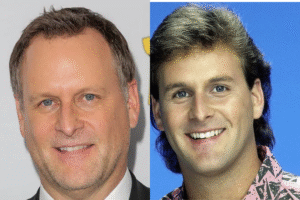
Character Creation Philosophy
Dave’s approach to character creation emphasizes emotional authenticity and psychological consistency rather than simply creating distinctive voices. His characters have genuine personalities and motivations that inform vocal choices and performance decisions throughout their development.
His understanding that voice acting requires the same emotional honesty as on-camera performance, despite the different technical requirements, has elevated his work above mere vocal mimicry to genuine character portrayal. This approach creates more engaging and memorable characters.
The longevity of many of his voice acting roles demonstrates the effectiveness of his character development approach. Characters that are built on solid psychological foundations can sustain audience interest and performer consistency across extended periods and multiple projects.
His influence on character development practices in animation and voice work continues to be felt as newer performers adopt his methods and apply them to contemporary projects. His legacy in voice acting extends beyond his individual performances to include his contributions to professional practices.
Educational Impact and Industry Training
Dave’s willingness to share his knowledge and techniques through workshops and educational programs has contributed to the professional development of numerous voice actors who have gone on to successful careers. His teaching emphasizes both technical skills and professional practices necessary for sustained success.
His educational work includes not only performance techniques but also business practices, professional networking, and career management strategies that help emerging voice actors navigate the industry more effectively. This comprehensive approach addresses the full scope of professional development.
The voice acting community’s respect for Dave’s expertise and generous sharing of knowledge has made him an informal industry leader whose opinions and recommendations carry significant weight. His influence on professional standards and practices continues to shape the field.
His educational legacy includes both formal training programs and informal mentorship relationships that have helped establish voice acting as a legitimate and respected entertainment specialty requiring specific skills and professional standards.
Chapter 10: Conclusion – The Enduring Legacy of Dave Coulier
Character and Values in Entertainment
Dave Coulier’s career represents something increasingly rare in modern entertainment—a performer who has maintained consistent values and authentic character throughout decades of professional success and personal challenges. His commitment to positive, inclusive humor and his refusal to compromise his essential decency for career advancement have created a legacy that extends beyond entertainment achievement.
His journey demonstrates that success in entertainment doesn’t require abandoning personal values or authentic character. His career proves that wholesome entertainment can be both commercially successful and artistically satisfying when it’s created with genuine skill and emotional honesty.
The respect he has earned from both industry professionals and audiences reflects not just his talent but his character and the way he has treated others throughout his career. His reputation for kindness, professionalism, and genuine care for others has created lasting relationships and opportunities that continue to enrich his life and work.
His example provides inspiration for emerging performers who want to build sustainable careers without compromising their integrity or values. His success demonstrates that authenticity and consistency are valuable assets in an industry often characterized by artificial personas and temporary trends.
Recovery Advocacy and Social Impact
Dave’s openness about his addiction and recovery has provided valuable social impact beyond his entertainment career. His willingness to discuss these challenges honestly has helped reduce stigma around addiction and recovery while providing hope and practical guidance for others facing similar struggles.
His recovery advocacy demonstrates how public figures can use their platforms responsibly to address serious social issues without exploiting their personal experiences for publicity or commercial gain. His approach emphasizes service to others rather than self-promotion.
The lives that have been positively influenced by his recovery advocacy represent a legacy that may ultimately prove more important than his entertainment achievements. His contribution to addiction recovery awareness and support has created lasting positive impact on individuals and communities.
His example shows that personal challenges can be transformed into opportunities to help others when approached with honesty, humility, and genuine desire to serve. His recovery journey has become a source of strength and purpose that enhances rather than diminishes his overall legacy.
Professional Longevity and Adaptation
Dave’s ability to maintain career relevance across multiple decades and different entertainment formats demonstrates professional adaptability and continuous learning that few performers achieve. His willingness to develop new skills and explore different creative outlets has protected him from the career stagnation that affects many entertainers.
His diversified career portfolio—television, voice acting, live performance, and advocacy work—has provided both financial stability and creative satisfaction while protecting him from dependence on any single type of work or project. This strategic approach has enabled long-term career sustainability.
His reputation for professionalism and reliability has created ongoing opportunities even as the entertainment industry has changed dramatically around him. His consistent quality and positive attitude have made him a preferred collaborator across different projects and production environments.
His career evolution demonstrates that success requires both talent and character, both artistic ability and business intelligence, both individual achievement and collaborative spirit. His balanced approach to professional development provides a model for sustained success in entertainment.
Family and Relationship Legacy
Perhaps Dave’s most important legacy lies in the relationships he has built and maintained throughout his life and career. His “Full House” family relationships have endured for decades, demonstrating that the show’s family values were authentic rather than merely scripted.
His commitment to recovery has enhanced his ability to maintain healthy relationships and has provided him with tools for supporting others through their own challenges. His marriage and family life reflect the stability and emotional health he has achieved through personal growth and commitment to positive values.
His mentorship of younger performers and his support for people in recovery have created networks of relationships based on service and mutual support rather than just professional convenience. These relationships continue to provide meaning and purpose beyond career achievement.
His example shows that entertainment success can enhance rather than compromise personal relationships when approached with proper priorities and authentic values. His life demonstrates that family, friendship, and community can coexist with professional ambition and achievement.
The Enduring Message
Dave Coulier’s life and career ultimately deliver a message of hope, resilience, and the transformative power of authentic human connection. His journey through challenges and triumphs demonstrates that it’s possible to maintain integrity and kindness while achieving professional success and personal happiness.
His story reminds us that everyone faces struggles and that seeking help is a sign of strength rather than weakness. His recovery journey and continued success prove that personal challenges don’t have to define or limit our potential for growth and contribution.
His commitment to using humor to heal rather than hurt, to build up rather than tear down, provides an example of how entertainment can serve positive purposes while remaining genuinely funny and engaging. His approach to comedy demonstrates that kindness and humor are compatible and mutually reinforcing.
Most importantly, Dave’s legacy reminds us that the measure of a life well-lived isn’t just professional achievement but the positive impact we have on others and the relationships we build along the way. His story shows that success includes not just what we accomplish for ourselves but how we help others accomplish their own goals and overcome their own challenges.
In an entertainment industry often characterized by ego, competition, and temporary success, Dave Coulier stands as an example of how authenticity, consistency, and genuine care for others can create lasting positive impact that extends far beyond any individual performance or achievement. His legacy continues to inspire both those who knew him personally and those who have been touched by his work and example from afar.
